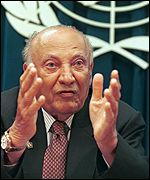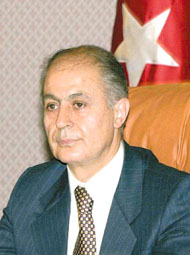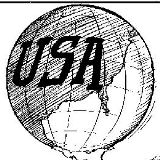2
OCTOBER 2001
![]()
2. "Cyprus shows off military hardware as warning to Turkey", Cyrpus displayed a range of new artillery weapons during independence day celebrations on Monday to signal its ability to defend itself against rival Turkey, which controls the north of the island.
3. "Turkish president backs democratic reforms", Turkish President Ahmet Necdet Sezer on Monday called for more democracy as Turkey's parliament prepared to vote on a series of constitutional amendments, including limiting the death penalty.
4. "Calling Turkey a "jewel", US lawmakers vow to win it more help", a group of visiting US congressmen on Monday praised predominantly Muslim Turkey as a "shining crown jewel" in a region of instability, and vowed to ask President George W. Bush to provide greater support for the country.
5. "Turk rights group warns of abuses while focus on US", Turkish human rights activists on Monday accused troops of shooting dead two men unjustifiably and warned abuses could be carried out while attention was focused on the suicide attacks on the United States.
6. "Syria shows up at Turkish defense show", Turkey's biannual defense show had some unusual visitors.
1. - Human Rights Watch - "Turkey: Parliament Misses Big Chance for Change":
Reform falls short on death penalty, free speech,
and torture
"The Turkish parliament is turning what should have
been a defining moment of change into just another lost opportunity.
And Turkish citizens will be the real losers here." Elizabeth Andersen,
Executive Director, Human Rights Watch Europe and Central Asia division.
A package of thirty-seven constitutional amendments will go to a vote on October 2. Human Rights Watch cautioned that, as now formulated, the reforms would maintain the death penalty and restrictions on freedom of expression and continue to deprive detainees of vital safeguards against torture.
"The Turkish parliament is turning what should have been a defining moment of change into just another lost opportunity," said Elizabeth Andersen, executive director of the Europe and Central Asia Division of Human Rights Watch. "And Turkish citizens will be the real losers here."
After making little progress on human rights in 2001, Turkey's leaders are now hurrying through a package of constitutional reforms, apparently to placate the European Commission, currently preparing its annual report on Turkey's progress towards accession to the European Union. But the measures fall well short of the E.U.'s "Copenhagen criteria" for human rights and democracy among applicant states, Human Rights Watch said.
The constitutional package does not address the practices that facilitate torture. Council of Europe and U.N. experts have for years urged Turkey to cease incommunicado police detention, where most torture occurs. Yet the proposed constitutional changes will not guarantee detainees prompt access to legal counsel. The provisions will reduce the length of police custody from seven to four days, but further legislation will be required to shorten the police custody of detainees in the southeastern provinces under the State of Emergency, where detainees can currently be held for ten days.
Human Rights Watch said the proposed constitutional changes also fall short on the death penalty. Turkey has maintained a sixteen-year moratorium on the judicial death penalty. The proposed changes would abolish the death penalty for civil offenses but retain it in circumstances of "war, the near threat of war and terrorist offenses." Most of the fifty executions since the 1980 military coup have been for offenses under those headings. The proposed changes will likely prove unsatisfactory to the E.U., which has made a priority of death penalty abolition.
Human Rights Watch also said that the constitutional changes would do little to expand freedom of speech for journalists and politicians in Turkey. Currently, Turkey's constitution offers no protection for any "statement challenging the unity of the state," punishable under hundreds of laws and regulations. In an apparent effort to bring the constitution in line with the European Convention on Human Rights, the original draft constitutional amendment changed reference to prohibited "statement[s]" challenging the unity of the state to "actions." The latest version refers instead to "activity," which judges, police and governors are likely to interpret as a license to continue their restrictions on freedom of expression and association.
"The package contains some worthwhile measures," said Andersen. "But many glaring constitutional shortcomings have been overlooked." Some of the changes may facilitate the use of minority languages in broadcasting, but the bar on education in minority languages remains intact. There will be no recognition of the right to conscientious objection, even though this was specifically recommended by the United Nations Special Rapporteur on religious intolerance in his 2001 report on Turkey. The reform also ignores the rapporteur's recommendation that the vague notion of secularism contained in Turkey's constitution and law be replaced by clearly stated formulations reflecting international human rights standards. In its National Plan for Accession to the E.U., the Turkish government suggested that it would remove government influence on the judiciary through the High Council of Judges and Prosecutors, but this too has been left out of the constitutional reform.
"For decades, successive Turkish governments have
enacted cosmetic measures to ease relations with international partners
while preserving the balance of fear between state and citizen,"
said Andersen. "Unfortunately, with these proposed constitutional
changes we're seeing that pattern repeated once again." ![]()
2. - AFP - "Cyprus shows off military hardware as warning to Turkey":
NICOSIA
Cyrpus displayed a range of new artillery weapons during independence
day celebrations on Monday to signal its ability to defend itself against
rival Turkey, which controls the north of the island.
During the military parade four new artillery batteries were displayed: 122mm BM-21 multiple rocket launchers, 203mm M110-82 self-propelled guns, M114 towed artillery pieces with 155mm cannons, and self-propelled 155mm artillery guns known as "Susanna". "This new equipment signals the National Guard's readiness to defend Cyprus," President Glafcos Clerides told reporters after the parade here to mark the island's independence from Britain in 1960.
He said the procurements were part of the government's commitment to improve the island's defences against any Turkish aggression. "We seek a peaceful solution but at the same time we must increase our defences to thwart Turkish expansionism," he said. Clerides said there were other new weapons he was "not going to talk about". "The parade affirms that Cyprus's armed forces are capable and ready to defend the island's right to freedom and independence," added Greek Defence Minister Akis Tsohatzopoulos, who attended the parade and later gave a news conference in Nicosia.
Tsohatzopoulos said the fight against global terrorism and rogue states made it all the more important to bring stability in the region and solve the decades-old Cyprus problem. "The Cyprus problem is a classic example of what all countries should be focusing on," said Tsohatzopoulos. UN-sponsored proximity talks were abandoned by Turkish Cypriot leader Rauf Denktash in November 2000 over demands his breakaway state be given equal recognition with the internationally recognised Greek Cypriot government.
The Greek defence minister strongly refuted claims by Turkish PM Bulent Ecevit that Nicosia was awash with laundered money and a danger to the European Union (EU). "Nobody can accept that criticism of Cyprus because it has proved on a daily basis that it upholds human rights and democracy and demonstrated such principles in its EU progress," said Tsohatzopoulos.
Cyprus is a frontrunner in the EU enlargement process.
Also paraded through the streets of the capital on Monday were TOR M-1
short-range anti-aircraft missiles, Greek and Russian-loaned helicopters,
plus scores of Russian T-80 and American M-48 main battle tanks. ![]()
3. - AP - "Turkish president backs democratic reforms":
ANKARA
Turkish President Ahmet Necdet Sezer on Monday called for more democracy
as Turkey's parliament prepared to vote on a series of constitutional
amendments, including limiting the death penalty.
Sezer, a former judge and a frequent advocate of democratic reforms, urged lawmakers to adopt laws to safeguard human rights and press freedoms and to enact measures to fight corruption.
"What kind of a Turkey do we want?" Sezer asked in a speech marking the formal opening of parliament following a summer recess. "An enlightened Turkey which has solved problems such as corruption ... (and) guarantees the rights and freedoms of a person."
Although parliament formally opened Monday, deputies convened two weeks ago to discuss 37 amendments to Turkey's freedom-restricting constitution drawn up in 1982 following a military coup.
Parliament is expected to hold a final vote on the package this week.
If the amendments are approved, the death penalty will only apply to cases involving terrorism and during times of war. It would also allow the use of the Kurdish language in broadcasting. Authorities could still, however, ban Kurdish broadcasts on grounds of national security and public safety. Education in Kurdish would still not be allowed.
The European Union, which Turkey hopes to join, is pushing the country to grant greater cultural rights to its estimated 12 million Kurds who are not recognized as a separate ethnic minority.
Sezer said parliament should enact EU-inspired laws to guarantee freedoms and to regulate the distribution of state contracts and help combat rampant corruption. Officials are frequently accused of favoring companies in state contracts in return for kickbacks.
Many believe that corruption is one of the causes of Turkey's
economic crisis which led the currency to lose more than half of its
value and left some 600,000 people unemployed. ![]()
4. - AFP - "Calling Turkey a "jewel", US lawmakers vow to win it more help":
ANKARA
A group of visiting US congressmen on Monday praised predominantly
Muslim Turkey as a "shining crown jewel" in a region of instability,
and vowed to ask President George W. Bush to provide greater support
for the country.
"Turkey has been a loyal ally... Turkey is like a shining crown jewel," said Republican Congressman Curt Weldon, chairman of the US armed services military readiness subcommittee, Anatolia news agency reported. "We believe that so far Turkey has not been given the significant role it has to be given in US foreign policy. We will work on this with Bush and (Secretary of State Colin) Powell when we go back home," Weldon said. Weldon, the head of a delegation of 11 congressmen, was speaking after talks with high-level Turkish military officials and diplomats over the US-initiated campaign against terrorism, which Ankara has pledged to back.
The congressman also said that Turkey, which is a member of NATO, suffered losses of about 30 billion dollars due to the sanctions imposed on its southern neighbor Iraq after the Gulf War, in which Ankara sided firmly with the US and opened its bases to strikes against Baghdad. "We have to rethink all these," Weldon said in response to a question on whether Ankara had any concerns regarding Washington's intention to launch an all-out campaign against international terrorism.
Many here are worried that an active Turkish role in eventual military action against a regional country could inflict damage similar to that suffered after the Gulf War, at a time when the country is already battling a severe financial crisis. Weldon added that the United States would draw upon Ankara's experience in fighting terrorism -- probably a reference to the country's struggle against Kurdish rebels, radical Islamists and far-left militants who have carried out terrorist attacks here over the past several decades.
The US congressmen's visit to Ankara followed a similar trip to Moscow, and a meeting with former Afghan king Mohammed Zahir Shah in Rome. Strictly secular Turkey is a staunch pro-western ally at a strategically important juncture between the volatile Middle East, the Caucasus and the Balkans.
Ankara has said that its airspace and airports would be
at the disposal of US transport planes if necessary, and that it would
provide Washington with intelligence on Afghanistan. But it has warned
against sending ground troops to Afghanistan, fearing that a ground
onslaught could turn any military intervention into a protracted affair.
Prime Minister Bulent Ecevit has also said that any operation against
Afghanistan should continue until the Taliban regime is ousted, but
has stressed that the overthrow of the hardline Islamic militia should
be left to the Afghan opposition forces, which need to be strengthened.
![]()
5. - Reuters - "Turk rights group warns of abuses while focus on US":
ISTANBUL
Turkish human rights activists on Monday accused troops of shooting
dead two men unjustifiably and warned abuses could be carried out while
attention was focused on the suicide attacks on the United States.
Emergency rule authorities in the mainly Kurdish southeast of Turkey described the two men shot dead on September 13 as members of the Kurdistan Workers Party (PKK), a separatist Kurdish group Ankara classifies as "terrorist."
The Human Rights Association (IHD) said in a statement the two men had been collecting food and supplies after being forced to leave their villages under a Turkish policy of clearing areas to protect residents from attacks and of denying shelter and supplies to the PKK.
"Both victims were civilians forced to migrate...by the forced migration policy," the IHD statement said.
"We are watching with concern how the atmosphere of uncertainty created by the fact that public attention has turned totally to the danger of global war has given courage to those who carry out rights abuses," said the statement, signed by IHD Chairman Husnu Ondul.
Officials in the southeast said the men, shot dead in the province of Sirnak, had entered an off-limits area carrying arms and food and said soldiers had been right to shoot.
"The area where they were found was a military area. They did not obey warnings from the security forces. They carried a Kalashnikov and their mule was carrying flour, butter, sugar and meat," an official told Reuters.
"They were linked to the organisation," he said, referring to the PKK.
More than 30,000 civilians, soldiers and rebels have died in fighting with the PKK, the majority of it in the southeast.
Officials said documentation and evidence from the case had been sent to Ankara for examination.
The human rights group named the men as Halit Aslan, 62, and Ebuzeyt Aslan, 42. Both were married with children.
"No global uncertainty or danger of global war can justify public authorities ignoring the law of human rights to solve domestic problems," the IHD statement said.
Turkey has backed U.S. President George W. Bush's war
against terrorism following the attacks on New York and Washington.
But it has criticised its European allies for what it calls their past
failure to support Ankara in countering the PKK. ![]()
6. -Middle East Newsline - "Syria shows up at Turkish defense show":
ANKARA
Turkey's biannual defense show had some unusual visitors.
The visits to the International Defense Industry, Aviation and Maritime Fair, or IDEF-2001 included Syrian generals. The visitors from Damascus marked the improvement of military relations between Ankara and Damascus.
The generals toured many of the 252 booths from 32 countries at the show. The generals were not seen at Israel's large pavilion, one of 32 countries to attend the fair.
The Syrian delegation was led by Gen. Abdul Rahman Sayad, head of military operations. Sayad led a four-man delegation.
Iraqi military officers also attended the fair. Iraq and Turkey have improved relations over the last year as Ankara has expanded trade ties.
France was not invited to the fair in wake of a French parliament resolution that recognized the Armenian genocide in Turkey during World War I. But French companies exhibited their wares at IDEF.
Greek Defense Minister Akis Tsochatzopoulos did not attend either. Turkish sources said Tsochatzopoulos was protesting the attendance by a delegation from the breakaway Turkish Republic of Northern Cyprus.
The exhibition was poorly attended amid Middle East tension that stems from an expected U.S. attack on Saudi billionaire fugitive Osama Bin Laden. Turkey has been providing military support to Washington's campaign.
The result was that many stayed away from the fair. Only seven defense ministers attended out of the 80 invited.
Turkey suspends energy policy
Turkey has suspended its energy projects amid the prospect of war in the region.
Officials said the projects have not been formally suspended. But no new plans have begun amid increasing tension in the Middle East amid U.S. plans to strike Saudi billionaire fugitive Osama Bin Laden.
They said this could include plans to open a natural gas pipeline between Iran and Turkey. The pipeline was to have begun operations in September.
"In case of a war, God forbid, all our energy policies
will be frozen," World Energy Council Vice President Huseyin Arabul
said. "Electricity energy policies which are currently in question
will be frozen and all of us will face a very serious crisis."
![]()